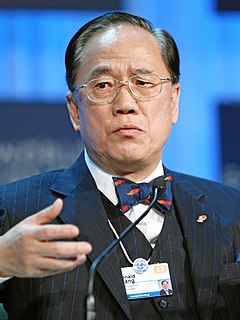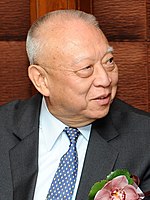
Tung Chee-hwa is a Shanghai-born Hong Kong businessman and politician. He was the first Chief Executive of Hong Kong upon the transfer of sovereignty on 1 July 1997 to 12 March 2005. He is currently a vice-chairman of the Chinese People's Political Consultative Conference (CPPCC).

The Government of the Hong Kong Special Administrative Region of the People's Republic of China, commonly known as the Hong Kong Government or HKSAR Government, refers to the executive authorities of Hong Kong SAR. It was formed in July 1997 in accordance with the Sino-British Joint Declaration of 1983, an international treaty lodged at the United Nations. This government replaced the former British Hong Kong Government (1842–1997). The Chief Executive also nominates principal officials for appointment by the State Council of the People's Republic of China. The Government Secretariat is headed by the Chief Secretary of Hong Kong, who is the most senior principal official of the Government. The Chief Secretary and the other secretaries jointly oversee the administration of the SAR, give advice to the Chief Executive as members of the Executive Council, and are accountable for their actions and policies to the Chief Executive and the Legislative Council.

The Liberal Party (LP) is a pro-Beijing, pro-business and conservative political party in Hong Kong. Led by Felix Chung and chaired by Tommy Cheung, it is currently the third largest party in the Legislative Council, holding four seats, and holds five seats in the District Councils.

The Chief Executive of the Hong Kong Special Administrative Region of the People's Republic of China is the representative of the Hong Kong Special Administrative Region and head of the Government of Hong Kong. The position was created to replace the office of governor of Hong Kong, the representative of the monarch of the United Kingdom during British rule. The office, stipulated by the Hong Kong Basic Law, formally came into being on 1 July 1997 when the sovereignty of Hong Kong was transferred from the United Kingdom to the People's Republic of China.

Sir Donald Tsang Yam-kuen is a former Hong Kong civil servant who served as the second Chief Executive of Hong Kong from 2005 to 2012.

The Executive Council of Hong Kong (ExCo) is the cabinet of the Government of Hong Kong, acting as a formal body of advisers to the Chief Executive of Hong Kong that serves as a core policy-making organ assisting the Chief Executive. It is analogous to other Executive Councils in the Commonwealth such as the Federal Executive Council of Australia, the Executive Council of New Zealand, and the Privy Council of the United Kingdom.

James Tien Pei-chun, GBS, OBE, JP is the former Chairman and Leader of the Liberal Party (LP) and former member of the Legislative Council of Hong Kong (Legco). Coming from the background of an entrepreneur, he was also a non-official member of the Executive Council of Hong Kong (Exco), member of Central and Western and Kwai Tsing District Council and Hong Kong member to the Chinese People's Political Consultative Conference (CPPCC).
Sir Ti-liang Yang, GBM, is a retired senior Hong Kong judge. He was the Chief Justice of Hong Kong from 1988–1996, the only ethnic Chinese person to hold this office during British colonial rule.

Elections in Hong Kong take place when certain political offices in the government need to be filled. Every four years, ninety representatives are chosen to sit on the unicameral Legislative Council of Hong Kong. Twenty seats representing the geographical constituencies are returned by the electorate, thirty seats representing the functional constituencies are elected through smaller closed elections within business sectors, and the remaining forty seats representing the Election Committee constituency are chosen by members of the Election Committee.

Legislative elections are held in Hong Kong whenever the Legislative Council needs renewal.

The 2005 Hong Kong Chief Executive election was held to fill the vacancy of the territory's top office. Then Chief Executive Tung Chee-hwa submitted his resignation to the central government in Beijing, and was officially approved on 12 March. As Donald Tsang, Chief Secretary for Administration in Tung's cabinet, was the only candidate, he was declared elected unopposed on 16 June. Tsang took office on 21 June to begin his first two-year term.

Principal Officials Accountability System, commonly referred to as the Ministerial system, sometimes the Accountability System, was introduced in Hong Kong by chief executive Tung Chee Hwa in July 2002. It is a system whereby all principal officials, including the Chief Secretary, Financial Secretary, Secretary for Justice and head of government bureaux would no longer be politically neutral career civil servants. Instead, they would all be political appointees chosen by the chief executive.

The 1996 Hong Kong Chief Executive election was held on 11 December 1996 to select the first Chief Executive (CE) of the Hong Kong Special Administrative Region (HKSAR) which term started from 1 July 1997 after the Chinese resumption of the sovereignty of Hong Kong from the British rule. It was selected by the 400-member Selection Committee installed by the Government of the People's Republic of China (PRC). Tung Chee-hwa, a Shanghai-born Hong Kong businessman who was seen being favoured by Jiang Zemin, General Secretary of the Communist Party of China, was the ultimate winner of the election, defeating former Chief Justice Ti-liang Yang and tycoon Peter Woo with a large margin.

The 2002 Hong Kong Chief Executive election was to select the second term of the Chief Executive (CE) of the Hong Kong Special Administrative Region (HKSAR). Incumbent Tung Chee-hwa was nominated by the 800-member Election Committee (EC) without competition.
The Preparatory Committee for the Hong Kong Special Administrative Region was a body established by the People's Republic of China government on 26 January 1996 for the transition of the Hong Kong sovereignty in 1997.

The 2003 Hong Kong District Council elections were held on 23 November 2003 for all 18 districts of Hong Kong, 400 members from directly elected constituencies out of total 529 council members. It was the second District Council election after the handover of Hong Kong in 1997.

The Second term of Tung Chee-hwa as Chief Executive of Hong Kong, or Tung administration, officially considered part of "The 2nd term Chief Executive of Hong Kong", relates to the period of governance of Hong Kong since the transfer of sovereignty of Hong Kong, between 1 July 2002 and 12 March 2005 until Tung Chee-hwa resigned from the office and the rest of the term was taken up by former Chief Secretary for Administration Donald Tsang.

The Third Legislative Council of Hong Kong was the meeting of the legislative branch of the Hong Kong Special Administrative Region Government. The membership of the LegCo is based on the 2004 election. The term of the session was from 1 October 2004 to 30 September 2008, during the second half of the Tung Chee-hwa's administration until his resignation in 2005 and was replaced by Donald Tsang for the rest of the term, and also the beginning of the third term of Chief Executive after Tsang won in the 2007 Election. The Democratic Alliance for the Betterment of Hong Kong (DAB) became the largest party with 10 seats. Notable newcomers to the Legislative Council included Leung Kwok-hung, Alan Leong, Ronny Tong, Albert Cheng, and Jeffrey Lam.

Simon Li Fook-sean was a Hong Kong senior judge and politician.
Dr. Ronald Leung Ding-bong, OBE, JP is a Hong Kong politician and businessman in banking.












